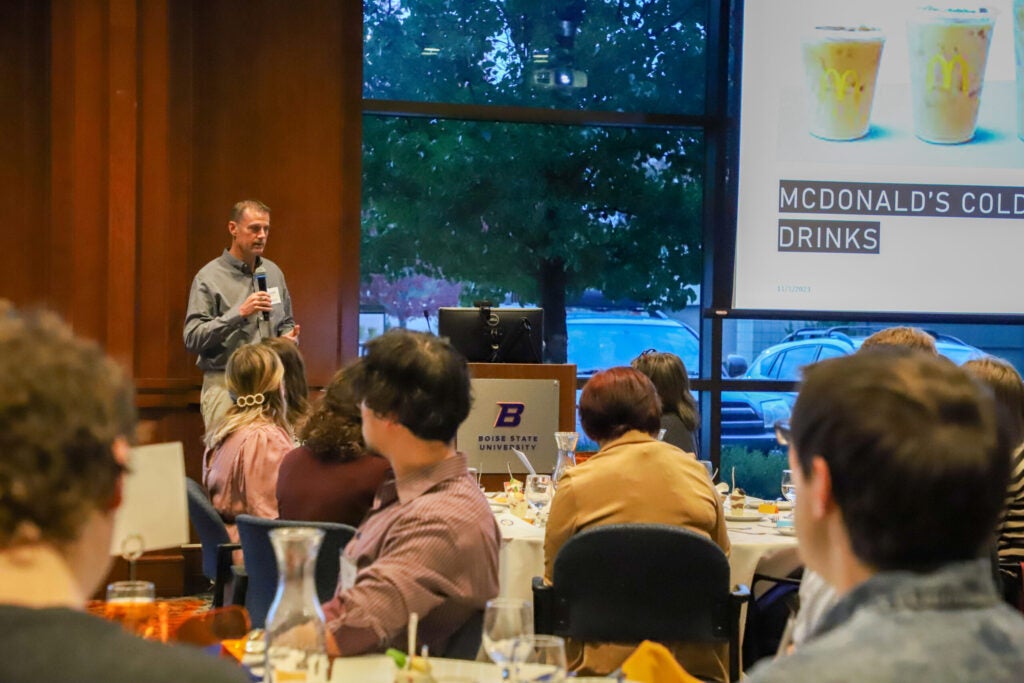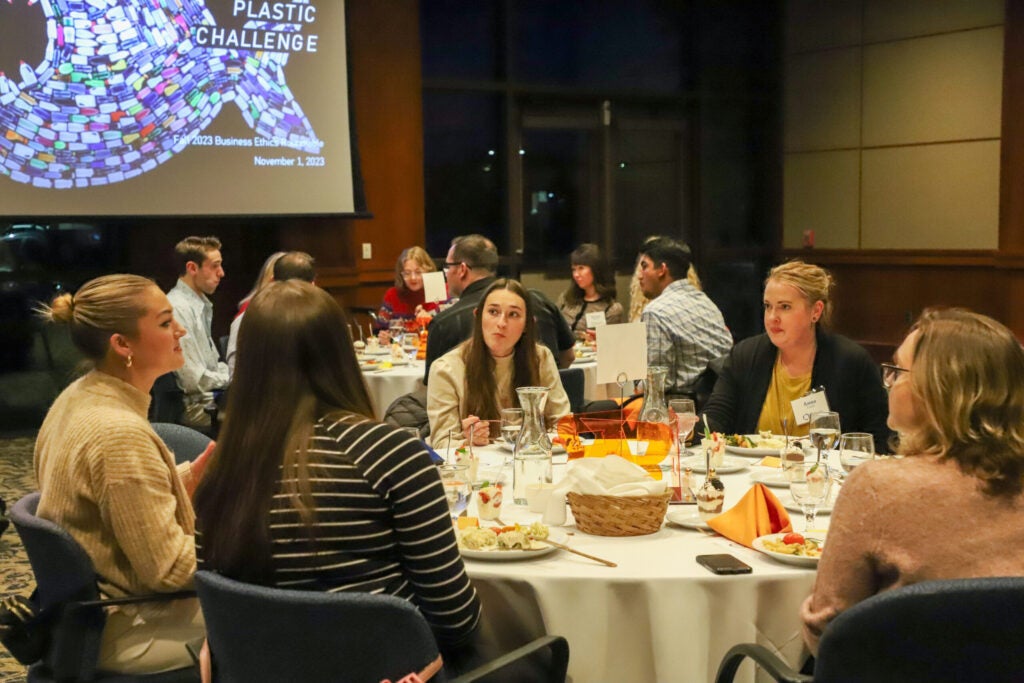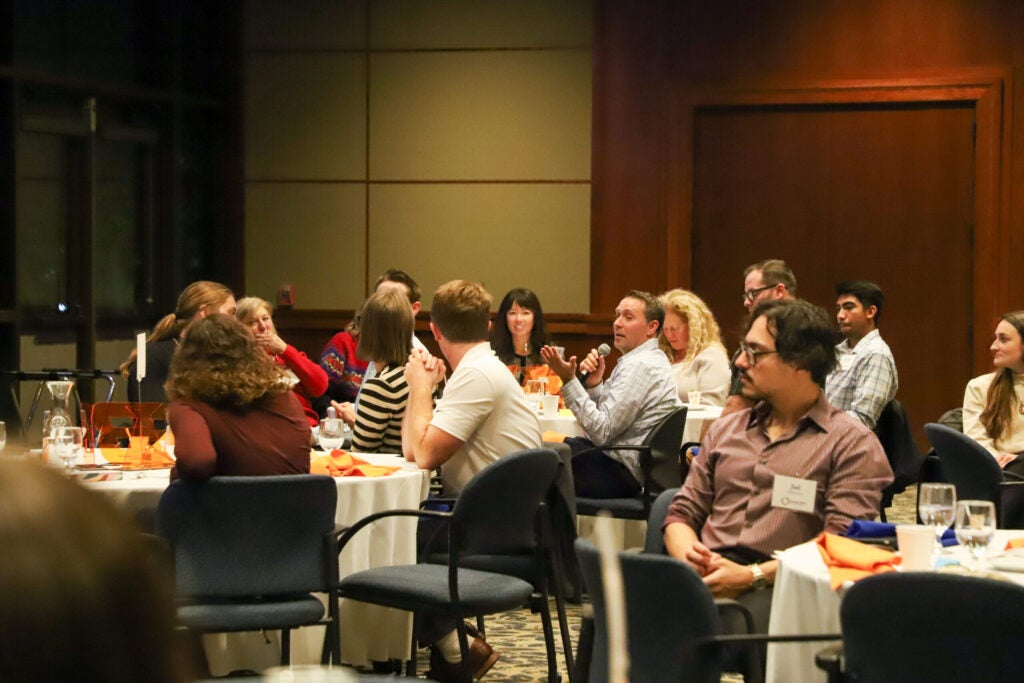Plastic pollution is a complex and rapidly growing concern with global plastic production and waste reaching alarming levels. It is an issue that exists for producers, consumers and recyclers, creating challenges at every step of the plastic lifecycle. On November 1, Boise State University students and faculty gathered with community members to explore plastic pollution at the fall 2023 Business Ethics Roundtable. The dinner table discussions focused on the challenges faced by McDonald’s Restaurants in South Central Idaho, through a case study presented by Twin Falls business leader Darren Kyle.

Understanding the Plastic Problem
Plastic Production is Complex
Plastic is deeply entangled with our global economy, primarily derived from oil and transformed into various polymers. The massive diversity of these polymers complicates recycling efforts, as each type must be processed separately. In the United States, roughly 9% of plastic gets recycled, primarily due to the labor-intensive and costly sorting process.
Additionally, economic factors contribute to the plastic waste dilemma. The low cost of oil makes producing virgin (unused) plastic more economical than recycling, and landfill fees that favor dumping plastics exacerbate this problem. Historically, exporting plastic waste to countries like China and Southeast Asian nations allowed exporting countries (like the United States) to avoid investing in necessary recycling infrastructure, which highlights our need for systemic change.
Regulatory Challenges
The regulatory framework for plastic in the United States is highly fragmented, with solid waste regulations often handled by local governments. This results in varied recycling rules across cities, towns, and counties, making it challenging for recycling efforts to achieve the necessary scale for economic viability.
The Plight of McDonald’s Restaurants of South Central Idaho
Darren Kyle, owner of 12 McDonald’s restaurants around Twin Falls and south central Idaho, has been grappling with the plastic issue in his restaurants. While McDonald’s has made strides in reducing its plastic footprint, particularly through the elimination of styrofoam containers and cups, Darren’s primary concern lies with plastic cold beverage cups and lids.

These cups and lids, constituting roughly 70% of the plastic footprint in McDonald’s restaurants, are made from #5 plastic. Addressing this issue, however, is not as straightforward as it might seem, due to two major complications:
Lack of Local Plastic Recycling
McDonald’s restaurants in cities that collect plastic for recycling offer in-store recycling bins. However, in cities like Twin Falls, where plastic recycling infrastructure is lacking, these cups and lids end up in the solid waste stream. This demonstrates the need for a more comprehensive approach to recycling infrastructure development.
Drive-Thru Dominance
Approximately 75% of customers at Darren’s locations use the drive-thru, leaving only about 25% to dine inside the restaurant. This high drive-thru traffic poses unique challenges, as the cups and lids end up in customers’ hands and are subject to local regulations and customer behavior. Moreover, the drive-thru’s fast-paced nature makes it impractical to encourage customers to use refillable beverage containers.

Developing Strategies to Change
As tables considered possible strategies to reduce plastic waste in McDonald’s restaurants, several key aspects emerged:
Promising Possibilities
- Collaboration with Local Businesses: Forming partnerships with local businesses, as suggested during the roundtable, could collectively advocate for improved recycling infrastructure, and address the lack of access to recycling in some areas.
- Supplier Engagement: Leveraging McDonald’s purchasing power to encourage suppliers to adopt sustainable materials for cups and lids can drive industry-wide change.
- Pilot Programs: Conducting pilot studies to incentivize customers to return cups and lids could provide valuable data and insights.
Out of Hand Issues
- Recycling Deserts: Addressing the challenge of recycling deserts, where access to recycling is limited, requires coordinated efforts at the community and legislative levels.
- Economic Realities: The economic factors that drive plastic waste need broader systemic solutions, potentially including policies that encourage recycling and disincentivize the use of virgin plastic.
Sequencing Strategies
- Prioritization: Identifying the most critical issues, such as access to recycling, may require initial attention to lay the groundwork for broader changes.
- Gradual Transition: McDonald’s can progressively introduce sustainable materials and practices, aligning with its goal of achieving all sustainable packaging by 2025.

Key Takeaways and Questions
As we navigate the plastic challenge, Darren’s situation presented some clear key takeaways:
- Collaboration and partnerships can be powerful tools for change
- The plastic problem is deeply interconnected with economic factors and regulatory complexity, requiring systemic solutions
- Incremental change, coupled with a long-term vision, can drive sustainable practices
Final Thoughts
The plastic issue faced by Darren’s 12 McDonald’s restaurants is emblematic of the broader issues faced by all businesses that use plastic. By addressing these challenges through strategic partnerships, gradual transition, and advocacy for systemic change, we can work toward a more sustainable future – one where the plastic problem is solvable!
Thanks to the participants at the fall 2023 Business Ethics Roundtable and, especially, to Darren Kyle for generously sharing his story. If you would like information on the next Business Ethics Roundtable, please contact us at COBEEthics@boisestate.edu.